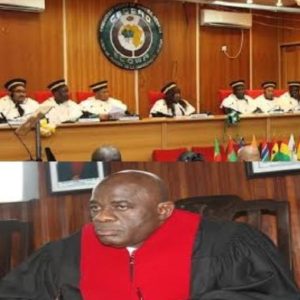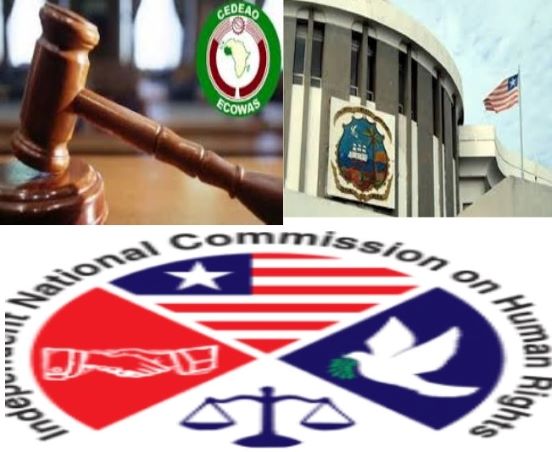By Frank Sainworla, Jr. fsainworla@yahoo.com
As the Liberian Legislature was pushing through the impeachment of former Associate Justice Kabineh Jan’neh earlier this year with the reported collusion of the Executive Mansion, it has emerged that members of the Independent National Human Rights Commission (INCHR) were legally advised that the proceedings was overshadowed by serious human rights breaches, but some Commissioners chose not to act.
As a result, the legal advisory concerning the eventual implications and consequence regarding upholding the basic domestic and international human rights convention could not be cleared, in order to reach the Legislative and Executive branches of government as required by the Act establishing the INCHR.
INCHR mandate
The INCHR is an institution set up by law with a mandate to protect human rights and justice is the Independent National Commission on Human Rights (INCHR) in 2005 coming out of an earlier 2003 Accra Comprehensive Peace Agreement, which officially ended 14 years of fratricidal civil war that caused the deaths of over 250,000 people.
If the CDC government of President George Manneh Weah had listened to the expert advice of well-meaning technocrats and professional institutions of the state and outside government concerning the 2020 impeachment proceedings of former Associate Justice, Kabineh Jan’neh, it would not have suffered the legal humiliation it did at the ECOWAS Court of Justice in Abuja, Nigeria earlier, a document in the possession of www.newspublictrust.com shows..
And also if integrity and pro justice institutions, such as the Independent National Human Rights Commission (INCHR) were to have mustered the courage and have the guts to speak true to power, the lapses in following the due process of law in pursuing the recent impeachment of the impeached and remove Justice as well as the violation of his human rights would have been avoided.
INCHR Legal Advisory & ECOWAS Court’s Ruling
The draft legal advisory document in our possession that could not be cleared by some timid members of the INCHR to reach the President and other leaders in government titled, “Legal opinion on the Impeachment of Associate Justice Kabinet Ja’neh,” reached almost the same conclusion reached by the ECOWAS Court regarding this landmark impeachment proceeding in count a.
“The failure of the National Legislature to evolve an impeachment procedure for the sole purpose of conducting impeachment proceedings as prescribed by the Constitution of 1986, renders the entire process including the sitting up of an Ad Hoc Committee, wanting in law. The principle of legality grounded in procedural fairness concern with giving an accused the opportunity to participate in the decision that will affect them, and crucially a chance of influencing the outcome of those decisions. The Commission holds the view that there were gross and reversible procedure errors that violate the due process of law cited in the Constitution and Supreme Court opinions.”
And similarly here is what the head of the Court, Justice Edward Amoako Asante said in the November 10, 2020 final ruling, quoting and affirming the argument of Janneh’s Lawyer, Mr. Femi Falana:
“The processes leading to his removal violated his human rights, particularly the right to fair hearing and impartial trial, right to work and dignity of person guaranteed by the African Charter on Human and Peoples rights, the Universal Declaration of Human Rights. Moreover, he claimed that the purported impeachment, trial, conviction, removal from office and replacement violated the Liberian constitution.” (ECW/CCJ/APP/33/19).

Impeached Justice Jan’neh (below) & ECOWAS Court above
As a result, in its ruling the ECOWAS Court has said the Liberian government must pay the sum of USD200, 000 (two hundred thousand dollars) as reparation for moral prejudice the impeached Justice suffered for the violation of his rights.
The 73-page judgement also “ordered Republic of Liberia, to restore, calculate and pay to the Applicant all his withheld entitlements, including salaries, allowances and pensions benefits as from the date of his impeachment to the date of notification of the Court’s judgment.
It further ordered his reinstatement as an Associate Justice of the Supreme Court or in the alternative, to grant him the right to retire from service on the date of notification of the judgment of the Court with full pension’s benefits as if he had retired at the normal retirement age for justices of the Supreme Court.”
Liberia’s Independent rights commission, which was established as a national institution to promote and protect human rights, was also created “to ensure the realization of human rights and enhance peace and national reconciliation through the implementation of the recommendations by the Liberian Truth and Reconciliation Commission.”
In 2017, the INCHR received an “A” Status accreditation with the Global Alliance for National Human Rights Institutions. With this status, the Commission has equal voice, representation and participation with regional and international bodies and human rights mechanisms, which will benefit its promotion and protection of the rights of all persons in Liberia. And the ECOWAS Court is one of such international bodies.
Another conclusion raised in count c of the INCHR in our possession says:
“The refusal of the House of Representatives to honor the writ of prohibition of the Supreme Court to determine the legality of the impeachment proceedings was a violation of the Constitution and respect for the rule of law because the Court has the authority to determine whether it has jurisdiction over the matter or not, especially when a party to the proceedings had raised constitutional issues, which the Court as a Constitutional Court needed to pass upon. The House flouted the law by being both the makers of the law and the interpreter of same. If the conduct or proceedings were seen to be contrary to the law, the appropriate forum was Court of Law and not the Legislature.”
Two key recommendations were therefore made:
“The House of Representative returns to status quo ante and together with the Senate prescribe an impeachment proceeding consistent with due process of law as enshrined in the Constitution.
“Respect for the independence of the Judiciary both as a constitutional duty and obligations provided for in the regional and international human rights and democratic instruments/treaties.”
Lessons learned?
Some sources close to the INCHR say had the majority members of the Commission not been timid and submitted the advisory to the government, and the government developed the political will to pursue the most legally prudent path, the rights violations raised by the regional Court would not have obtained.
The ECOWAS Court, which has given the Republic of Liberia six months to report on the enforcement of the judgment, ordered that impeached Justice Janneh be given reparation for moral prejudice suffered for the violation of his rights, due to lack of fair hearing and his right to work.
One would say it’s now “water under the bridge” in so far as the Janneh’s impeachment is concerned. But one lesson that should be learned, one political legal analyst argues is that justice and integrity institutions of the state such as the INCHR must always step up to the plate, when such serious national issues arise in fulfillment of their legal mandate.
Whether or not the Executive, Legislative branches and/or Judiciary branches of government take cue and act on such expert advisory, they will have gone on the record to have given their position on the issue(s) at hand in the national interest.
Meanwhile, the head of the ECOWAS Court, Justice Edward Amoako Asante weeks ago warned the Liberian government that it risks sanctions and other legal penalties, it refuses to carry out the Court’s order in favour of the impeached former Associate Justice of Liberia.

